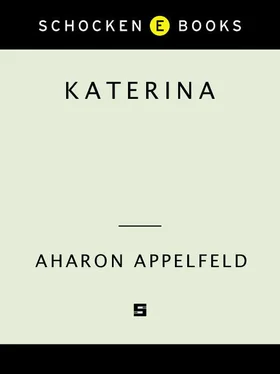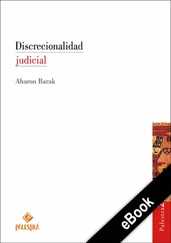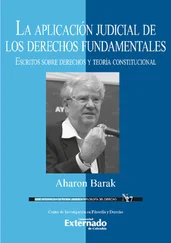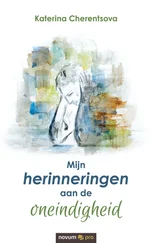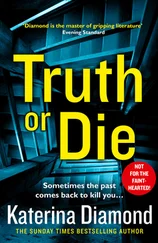
27
DURING THE DREADFUL NINETEEN FORTIES I almost didn’t write, and what I did write, I destroyed with my own hand. I worked without fatigue, as if the beet field were my own farm. The trains, which would pass before us, were crammed with Jews. All the women were happy that we would be rid of them once and for all.
They would fight among themselves over every piece of cake, blouse, or ointment. The cells in solitary confinement were full, and shouts were heard day and night. The jailers used to spray water into the cells to silence the women. During the nineteen forties, darkness descended upon me. All my bonds with my dear ones were severed. I knocked on the doors at night in vain. No sign, or any word, came from them, only darkness upon darkness and a great abyss.
At that time a skin disease spread over my body. The disease ravaged my face and made it hideous. “The monster,” the prisoners used to whisper. My face was covered with red and pink spots, and my hands swelled. I was like an uninhabited cave, with no sights and no thoughts. True, they still didn’t dare offend me and they didn’t abuse me. Mainly, I worked alone, and if they attached a prisoner to me, she refrained from talking to me. Sometimes the chief jailer would come into my room and exchange a few words. Once she asked me if I wanted to return to the shed. “I’m better off here,” I said, and she didn’t bother me about that anymore.
Sweet and sourish smells wafted in from every side. I didn’t know that was the smell of death. Everybody else knew, and they said it, that it was the smell of the Jews’ death, but I refused to listen. I was certain they were wicked hallucinations.
In the early morning, while I was still pulling beets out of the earth, long freight trains would pass by. The prisoners used to greet the trains with shouts of joy, “Death to the merchants, death to the Jews.” They knew everything. Their senses were lively. They sat in prison, but they knew everything that was going on around them—how many Jews had been sent and how many were going to be sent. Each train aroused a wave of joy, and at night they would sing:
“Finally they’re burning
Our Lord’s killers and opposers,
The smell of those fires
is sweet perfume to our noses.”
That was a mighty song that reverberated until late. The jailers ignored standing orders and let them sing. They sang enthusiastically, the way they sang Christmas carols, and they tapped their feet and bellowed.
And I, almighty God, I took care of myself. I was certain that pink, virulent sickness would do away with me. That concern filled my whole being. Now, when I think about my blindness and selfishness, shame devours me. Let me quickly add that it was then that I once again found a path to the Psalms. I clung to the holy words, and I used to pray for long hours. The verses would calm my fears. Forgive me, God, for that selfish prayer as well.
Day after day the trains rolled by. There was no longer any doubt that death was not far away. In the courtyard, wagons heaped with clothes stood abandoned. No one wanted them. Moisture ruined them, and within a matter of days they lost their shape. On visiting days, people no longer brought clothes but gold jewels.
At lunch, Sigi approached me and said, “It’s hard for me to bear your silence, Katerina. Not many years ago we were friends. Why are you pushing me away? I have no one in this world.”
“I’m not angry at you.”
“Why won’t you come back to us in the shed? It’s easier together than alone. Isolation makes you sick.”
“I need to be by myself. To sit quietly and heal my wounds.”
“Come to us. We need you very much.”
“Thanks, Sigi.”
“We women are all responsible for each other, aren’t we?”
“True.” I said what I had to.
Sigi had grown old in the past two years. Her full face, which had known both lust and faith, had sagged. When the day came and she was set free, she wouldn’t know what to do with her freedom. Her face had put on a prison mask, the same pallor and the same neglect. Now she still sang at night, but on the outside she wouldn’t know how to open her mouth. No wonder all her relatives had abandoned her and her children had not even visited once.
“You’re thinking about the Jews.” She surprised me.
“True. How do you know?”
“You mustn’t think about them. That’s their fate. That’s God’s will.”
“I understand.”
“We mustn’t ask about what’s above us and what’s below us. Do you understand?”

28
AGAIN, THE DAYS WERE BRIGHT and hot and I worked harvesting corn. The skin disease continued to spread over my face in a thick rash, and everyone avoided me. The chief jailer assigned me a corner of the field so I wouldn’t have contact with anyone. After a day’s work, I would return alone, and behind me, at a good distance, followed the jailer. If I hadn’t been a murderess, they certainly would have freed me. They free afflicted people, but they are strict with murderesses.
Only the other Katerina, from my village, dared to approach me. I told her that it didn’t hurt much and that I could bear it. It was a discomfort you could overcome. I was glad to have found the correct words. Katerina lowered her head, as though I had recited a verse from Scripture.
Poor Sophia, the woman I had beaten, called from a distance, “Katerina, for my part I forgive you for everything. If only we could see you healthy among us.” She wore a broad peasant kerchief on her head, and she looked like a miserable servant.
The nights were hot and close, with no air to breathe. Like black snakes, the trains twisted through the valley. Prisoners no longer stood by the bars and shouted, “Death to the merchants, death to the Jews.” Now there was no doubt that after the Jews were all dead, they would free all of us. We had to await their death patiently. Not many were left, and those few were being transported in trains. Through cracks in the wall I caught the whispers. It wasn’t malice but tense expectation.
How correctly they had guessed only became known to me later. Even during that accursed summer I was cut off from all my dear ones. My isolation and illness surrounded me like a tight band. The fire was trapped in my bones, wiping out every part of me. My soul dried out from day to day in my swollen body.
And at night, strong flames would penetrate my sleep and lick my flesh. I was very close to death, but each time an escape opened before me. After all, prison isn’t a sealed freight car. More than once during that long summer I wanted to loose the shackles from my hands, to grasp one of the prisoners and shake her powerfully. They used to grovel before the jailers like slaves, all for a bit of drink or some powder or cologne. One mustn’t grovel, and one mustn’t wish for other people’s death. Death isn’t the end. There are heights upon heights, cried all my limbs. My mother used to come back to my body and fill me with courage. My arms were ready for the struggle, but there was no strength in them. The prisoners knew that, and they didn’t fear me anymore.
There was one very old woman in the sheds, a woman of about ninety, who had completed her prison term years earlier but refused to be set free and asked to stay. Her wish was granted, and she remained not only with the women of her generation but also those of the two following generations. She was the prison’s memory. She recalled all the practices of earlier years—who was freed and when, who was sick and who was healed, who had a bitter fate and who was fortunate. But, mainly, she taught the prisoners patience. Patience is a holy virtue. When a person acquires that virtue, no harm can come.
Читать дальше
